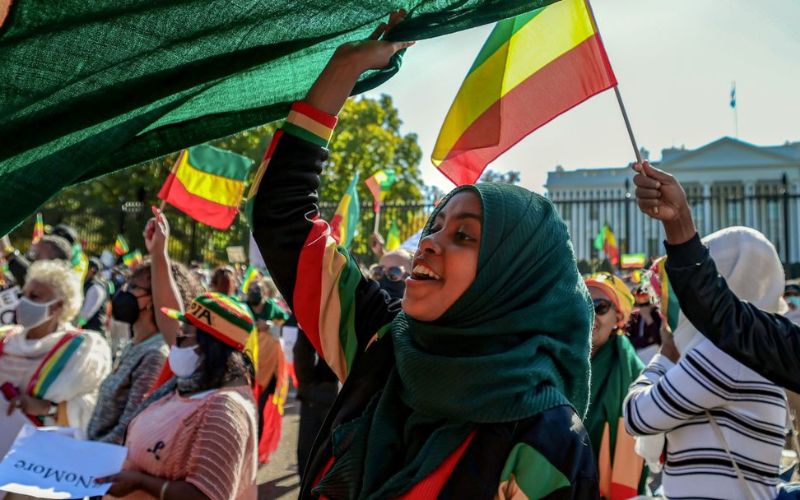One of the most important festivals on the Ethiopian calendar, Timkat (Timket) is celebrated across the country. Tourists in Ethiopia during Timkat are treated to 3 days of festivities.
Timkat is an Orthodox Christian occasion to mark the baptism of Jesus Christ in the River Jordan. People travel to Ethiopia to take part in Timkat which involves processions, singing, and dancing.
Spending time in Ethiopia is an excellent way for tourists to get an insight into the religion, culture, and traditions of the African nation.
This article provides an explanation of the key events and the best places to spend Timkat, as well as advice for obtaining an Ethiopia visa in time for the trip.
When is the Timkat Festival?
Timkat is on 19th of January (20th on leap years) preparations, called Ketera begin the day and the full event lasts for 3 days. It is celebrated on this date to correspond with the 11th day of Terr.
In 2022, Timkat is on Wednesday, January 19th. Tourists should be aware that Timkat is a public holiday and most businesses remain closed.
January is one of the best months to visit Ethiopia with warm, sunny weather and low rainfall. Leddet, Ethiopian Christmas, also takes place this month, on the 7th January
How is Timkat Celebrated?
Timkat commemorates Christ’s baptism and takes place over 3 days. The most important day is the 19th of January and this is when the blessing of water and reaffirming of baptism vows to take place.
Christianity is the biggest religion in Ethiopia and 43% of the population is Orthodox Christian which means that many Ethiopians mark the occasion of Timkat.
Ketera: preparations the day before Timkat
On the 18th of January (19th on a leap year) preparations take place for Timkat. On this day models of the Ark of the Covenant, called Tabots, are taken from churches and wrapped in cloth and silk. The most senior priest from each church leads the procession to the river or bath, carrying the tabots on their heads.
The tabot symbolizes the tablets on which the 10 commandments were written and presented to Moses by God on Mount Sinai. The priests and some other participants keep vigil over the tabots during the night.
The main celebrations take place on the second day of Timket
Mass begins in the early hours of the morning on January 19th, continuing until around 7 am. Locals wear white clothing and cover their heads with scarves.
Following mass, speeches are made by important church figures and the water is blessed. Participants then submerge themselves in the water, renewing the vows they made at the baptism.
This key part of the celebration is a reenactment of the baptism of Jesus in the River Jordan.
What food is eaten during Timkat?
After the reenactment of the baptism of Jesus, pilgrims enjoy a special Timkat feast with their families.
The typical food eaten at Timkat is Injera, an Ethiopian flatbread that is filled with various meat and vegetables, and eaten with their hands. Injera is enjoyed at many of Ethiopia’s annual festivals, such as Meskel which takes place each September.
Doro Wat, an Ethiopian spiced chicken dish, is one of the nation’s most well-known dishes and is also eaten during Timkat.
The drink of choice is coffee which is often freshly roasted and prepared.
The final day of the Timkat festival
The third and final day of Timkat takes place on January 20th (or 21st). The tabots which had been carried to the water are taken back to the churches in a similar procession.
With this, the annual Timket festivities draw to a close.
Where to Celebrate Timkat in Ethiopia
Tourists can take part in the Timkat festival wherever they are in Ethiopia. However, those who want to enjoy the biggest and most important events should head to:
- Gondar
- Abbis Ababa
- Lalibela
Celebrating Timkat in Addis Ababa, the Ethiopian capital
Addis Ababa is the capital of Ethiopia with many interesting things to see and do including museums, markets, and churches. The largest church in Addis Ababa is the Medhane Alem Cathedral.
Most overseas visitors arrive at Addis Ababa Bole International Airport which is just 4 miles (6km) from the city center.
Some of the biggest Timkat festivities take place in Gondar
Gondar is an ancient Ethiopian city, in the north of the country. Gondar was particularly important during the reign of Emperor Fasilides in the 17th century, during this time palaces, castles, and a royal bath were built. It is this royal bath that is filled once a year at Timkat.
Tourists can take a domestic flight from Addis Ababa to Gondar Airport, also known as Atse Tewodros Airport. The journey takes one hour.
Lalibela, one of the holiest cities in Ethiopia
The rock-hewn churches of Lalibela are famous. Lalibela is one of the most religious cities in Ethiopia and an important place for pilgrimages.
Pilgrims from across the land flock to Lalibela to take part in Tamika processions. Lalibela is also in the north of Ethiopia, the flight from Addis Ababa to Lalibela Airport takes one hour.
Advice for Tourists Traveling to Ethiopia for Timkat
Tourists are warmly welcomed to attend Timkat celebrations, they should show respect for the customs and traditions.
It is advisable to book accommodation in advance as many pilgrims head to Ethiopia to take part in the yearly event. The places listed above get particularly busy.
Visitors should pack appropriate clothing for summer in Ethiopia, average high temperatures in January are around 72 °F (23 ºC). Cool, light clothing is recommended plus some warmer items for the evening when temperatures drop to 41 ºF (5 ºC).
Travelers should ensure they apply for an Ethiopia visa at least 3 days prior to departure. People arriving in time for the Timkat festival 2022 should send their visa requests before 15th January.



0 Comment